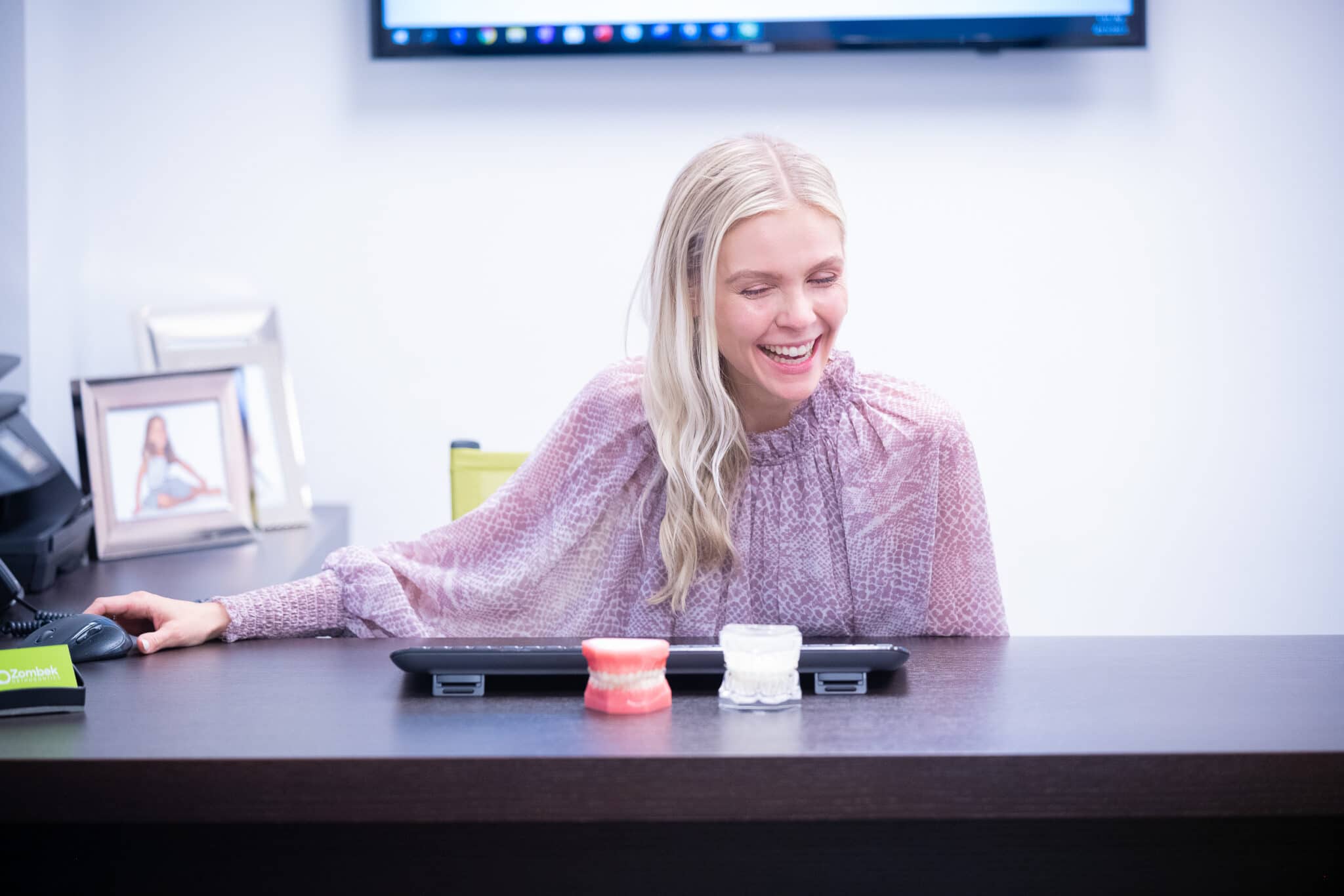Thumb-sucking is a common habit for children, but it can also be a habit for some adults. It’s not as common as with children, but the underlying reasons are often similar. Small children usually suck their thumbs as a comfort measure to relieve anxiety. Over time, they break the habit as they get older, but they may pick it up again as adults. While it seems a far less destructive habit than some others, thumb-sucking can actually cause substantial issues with your dental health and, eventually, your overall health. Luckily, there are several tips, tricks, and methods to help with breaking this habit, including ones Zombek Orthodontics can offer in a comfortable, nonjudgmental environment.
Thumb-sucking can cause your teeth to become misaligned because as you suck your thumb, your thumb pushes your top teeth out while your tongue pushes down and into the back of the front teeth. This can lead to overbites or crossbites. It can also eventually lead to other issues, such as snoring and sleep apnea, which can cause health issues such as heart disease. Many adult patients are hesitant to ask for help in breaking this habit, but at Zombek Orthodontics, we understand and will treat you with dignity and respect.
Adult thumb-sucking isn’t talked about as much as child thumb-sucking, but it may be more common than people think. Some researchers estimate that 1 in 10 adults suck their thumb at one point or another. Some just never break the habit from childhood, while others take up the habit to relieve anxiety.
It’s believed that adults use thumb-sucking to reduce stress or anxiety. It can also provide comfort or relaxation. The psychological and behavioral effects aren’t completely understood. What is known though, is the damage thumb-sucking can do to your dental health, and eventually, your overall health.
Thumb-sucking begins causing oral issues before teeth even appear in children and can continue to cause several dental issues as the teeth grow in for babies and children. When adult teeth grow in, more issues can arise. Often, an orthodontist must address these issues before they cause more problems, such as snoring and sleep apnea, which can lead to heart problems.
The thumb presses against the palate, or the roof of the mouth, and makes it more concave. This can misalign the teeth and lead to snoring or sleep apnea problems. It can also cause the teeth to move, creating an overbite, a deep bite, or an open bite. This can cause issues with chewing and speaking. Thumb-sucking also leads to a higher likelihood of getting infections and other sicknesses due to bacteria and viruses being introduced to the mouth by the thumb.



It isn’t easy to break a thumb-sucking habit, especially if it’s a lifelong habit. Most habits are not easy to break, simply because your body gets used to certain behaviors and coping mechanisms. BUT, IT IS POSSIBLE. It is always possible to stop habits you do not want to continue and start new habits. The big thing to remember is to start with a small goal, like not sucking your thumb for one day, and then build up to bigger and more permanent goals. And when it comes to stopping your thumb-sucking habit, we can help! Zombek Orthodontics has suggestions for breaking the habit, and if those don’t help, we have tools that can do the job.
Because it’s believed thumb-sucking is used to relieve anxiety, addressing that stress or anxiety is a good start to getting rid of the habit. Try reducing stress with physical exercise, meditation, or deep-breathing exercises. There are several resources that can help with this, including apps and online videos.
Cognitive-behavioral therapy is another option that may help get to the root of your habit and the causes for it. This therapy examines the causes of the stress or anxiety and provides ways to cope with it.
Other home remedies are available, such as using a nontoxic fingernail coating made to stop thumb-sucking by creating a bitter taste in the mouth. If you mainly find yourself sucking your thumb at night and when you sleep, you can also try wearing gloves, a bandage on your thumb, mouth taping, or even wearing a sock on your hand. These are all methods that can be helpful for fingernail biting habits as well.
If home remedies don’t work, Zombek Orthodontics can help. We have a special appliance that acts as a tongue crib to train the tongue to stay off the back of the upper front teeth. This tongue crib makes it difficult, if not impossible, to suck your thumb. The tongue crib serves the other purpose of training the tongue to sit back from the teeth, so it’s not uncommon to see an orthodontic patient with it. Rest assured, you won’t be the first person we’ve seen with this habit. You won’t find judgment here. Instead, you’ll find a team of professionals who will provide you with friendly, compassionate, judgment-free care.
We can examine your teeth, determine what orthodontic issues you may have due to the thumb-sucking, and create a treatment plan to straighten your teeth. We can also figure out whether braces or clear aligners will best benefit you. If you live in the Weston, FL, or Hollywood, FL, areas, you can schedule an appointment with us.
Adult thumb-sucking may be a hard habit to break, but it is breakable, and doing so can benefit your overall health. If you’re ready to take the first steps, Zombek Orthodontics is here to help!

 This site’s strategy, design, photo & video were created by the marginally-above-average folks @ Clear Partnering Group.
This site’s strategy, design, photo & video were created by the marginally-above-average folks @ Clear Partnering Group.